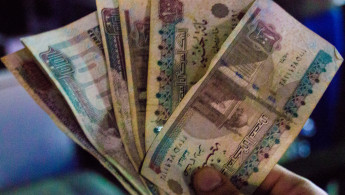Egyptians deposit 11bn EGP as national banks offer high-interest CDs
Egypt’s two major national banks have received around 11 billion Egyptian pounds (around $357.65 million) in citizens’ deposits for newly issued high-yield certificates of deposit (CDs) within a day of their release.
The National Bank of Egypt (NBE) and Banque Misr, the country’s two major banks where most Egyptians' savings are kept, issued new CDs on Thursday offering interest rates of up to 27 percent annually. This came just after earlier CDs from 2023 were due to be cashed out by depositors, local news outlets reported.
“The move of putting forward high-interest CDs is meant to garner as much cash as possible at a time when citizens lost trust in their local currency, resorting to gold bars and coins and US dollars to maintain their savings,” financial analyst Ahmed Hamouda told The New Arab.
“The new CDs do not create balance or compensate for almost 50 percent loss of value inflicted on the Egyptian pound over the past two years, though,” he said.
Egypt's planning ministry recently declared that the remittances from Egyptians working abroad in the first quarter of the fiscal year 2023/2024 had dropped by almost 30 percent compared to the same period last year. The payments fell from $ US 6.39 billion in July-September 2022 to $US 4.52 billion in the same period for 2023.
In October 2022, the Central Bank of Egypt imposed exchange rate flexibility, allowing the value of the Egyptian pound to be regulated by market forces. This caused the prices of goods to rise by over 70 percent due to Egypt depending heavily on imports.
The change aimed to save Egypt's already ailing economy after securing a US$3 billion loan from the International Monetary Fund (IMF).
One US dollar is worth 30.95 EGP in banks and currency exchange offices, and 50 EGP in the parallel, informal market at the time of publication.
Experts believe that severe economic mismanagement has also played a significant role in Egypt's current predicament, particularly with the government of President Abdel Fattah al-Sisi investing billions of dollars in "white elephant" projects, such as the New Administrative Capital.




 Follow the Middle East's top stories in English at The New Arab on Google News
Follow the Middle East's top stories in English at The New Arab on Google News


